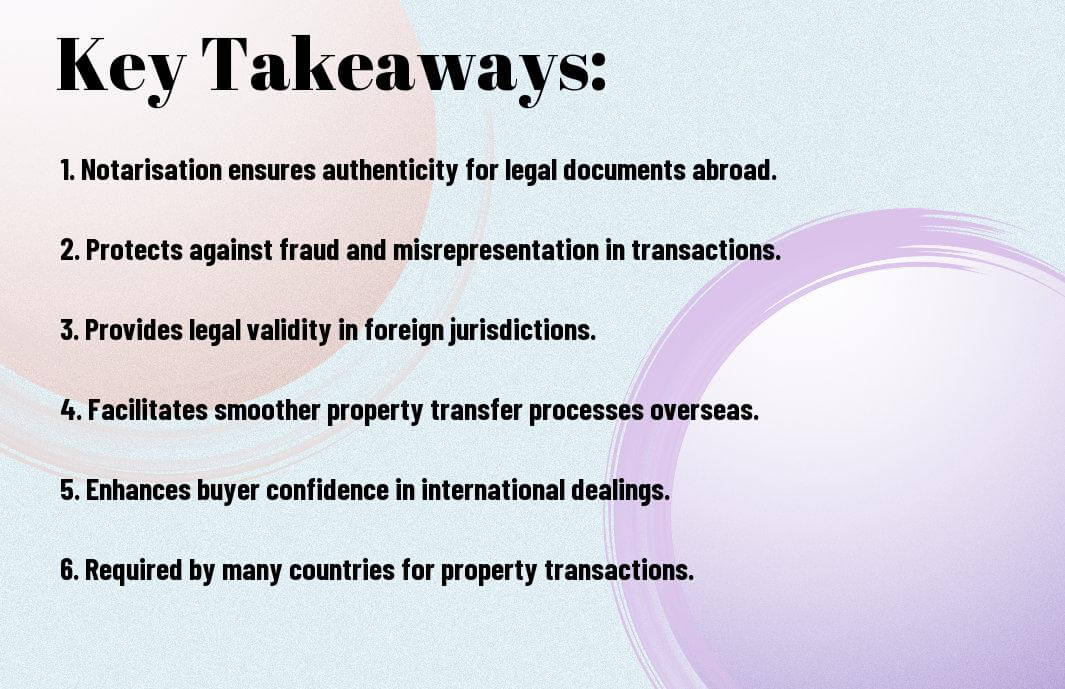You may find that navigating the complexities of overseas property transactions can be overwhelming, and understanding the role of notarisation is necessary for safeguarding your investment. Notarisation serves as a key step in verifying the authenticity of documents and ensuring that all parties involved are protected from fraud. By utilizing notarised documents, you can bolster your legal standing and enhance the credibility of your transaction, ultimately making your overseas property investment process smoother and more secure.
Key Takeaways:
- Authentication: Notarisation provides an official verification of signatures and documents, ensuring that they are legitimate and credible.
- Fraud Prevention: The notarisation process helps reduce the risk of fraudulent activities in property transactions by confirming the identities of the parties involved.
- Legal Compliance: Many jurisdictions require notarised documents for legal validity, ensuring adherence to local laws and regulations during overseas transactions.
- Record Keeping: Notarised documents create a formal record that can be imperative for future reference or in case of disputes.
- Increased Confidence: Having documents notarised can provide peace of mind to all parties involved, promoting trust and reliability in the transaction process.
Understanding Notarisation
Before engaging in an overseas property transaction, you should be familiar with the concept of notarisation. Notarisation serves as a safeguard, ensuring that your documents are legally valid and recognized internationally. For more on Notary public and its role in property sales, understanding this process can help you navigate the complexities of foreign real estate dealings.
Definition and Purpose
Understanding notarisation is important as it confirms the authenticity of documents used in property transactions. A notary public verifies the identity of the signatories, ensuring that all parties are willing and mentally competent. This authentication helps prevent fraud and protects your interests, providing an extra layer of legal assurance in your dealings.
Types of Notarisation
Against the backdrop of international property transactions, it’s important to know that there are various types of notarisation available. Each type serves specific purposes and varies by jurisdiction. Here are some common forms:
- General Notarisation
- Apostille Certification
- Document Authentication
- Specialised Notary Services
- Electronic Notarisation
This varied approach ensures that your documents meet specific legal requirements in different countries.
| Type | Description |
|---|---|
| General Notarisation | Standard verification of signatures and documents. |
| Apostille Certification | International certification for document acceptability. |
| Document Authentication | Validation of the authenticity of legal documents. |
| Specialised Notary Services | Tailored services to meet specific client needs. |
| Electronic Notarisation | Online notarisation through digital platforms. |
Notarisation plays a significant role in establishing the legality and trustworthiness of your property transaction documents. Various types ensure that you have the right level of validation for your needs. Here are the types again:
- General Notarisation
- Apostille Certification
- Document Authentication
- Specialised Notary Services
- Electronic Notarisation
This diversity aids you in choosing the correct type of notarisation for your unique situation.
| Type | Description |
|---|---|
| General Notarisation | Standard verification of signatures and documents. |
| Apostille Certification | International certification for document acceptability. |
| Document Authentication | Validation of the authenticity of legal documents. |
| Specialised Notary Services | Tailored services to meet specific client needs. |
| Electronic Notarisation | Online notarisation through digital platforms. |
The Role of Notarisation in Overseas Property Transactions
Now, when engaging in overseas property transactions, notarisation serves as an important safeguard for you. It verifies the authenticity of documents, ensuring all parties involved are legitimate. This process not only facilitates smoother transactions but helps you navigate the complexities of foreign real estate laws, offering you peace of mind as you make significant investments abroad.
Legal Validity and Protection
Overseas property transactions require a robust framework to ensure legal validity and protect your rights. Notarisation establishes the legal standing of your documents, making them recognized by foreign authorities. By having a notary validate your agreements, you enhance their credibility, ultimately safeguarding your interests in international dealings.
Mitigating Fraud and Disputes
Behind every overseas property transaction, the risk of fraud and disputes looms large. Notarisation acts as a deterrent, making it more difficult for fraudulent activities to occur. Not only does this process help you authenticate the identities of all parties involved, but it also creates a clear, legally binding record of the agreement, reducing potential misunderstandings.
Validity in transactions is vital, and having your documents notarised significantly lowers the chances of disputes arising in the future. With a notary overseeing the signing process, you ensure that all parties comprehend the terms and conditions of the agreement. This public acknowledgment of the transaction details creates a reliable reference point, making it easier to resolve potential conflicts should they arise later on. Notarisation ultimately empowers you by reinforcing the integrity of your property dealings overseas.
The Notarisation Process
Keep in mind that the notarisation process is important for validating documents related to overseas property transactions. It involves a series of formal steps that ensure your paperwork is legally recognized and can provide you with peace of mind when investing abroad. Understanding this process will help you navigate the complexities of international real estate dealings with confidence.
Steps Involved
One of the first steps in the notarisation process is to gather all relevant documents that require notarisation. This can include contracts, property deeds, and identification. The next step involves approaching a licensed notary public who will review and authenticate your documents, ensuring they meet local legal requirements before proceeding with the transaction.
Requirements and Documentation
The key requirements for notarisation typically include valid identification and specific documents related to the property transaction. Additionally, the notary may require you to provide information regarding the parties involved in the transaction and any previous agreements relevant to the property.
Involved in the notarisation process are specific documents like your passport or national ID, proof of address, and any agreements pertaining to the property. It’s important to ensure that these documents are accurate and complete to facilitate a smooth notarisation. For some jurisdictions, you may also need to provide additional documents, such as tax clearance certificates or financial statements, depending on local laws. Being prepared and organized with all necessary documentation will expedite the notarisation and help you avoid potential delays in your overseas property transaction.
Country-Specific Notarisation Regulations
Many countries have their distinct notarisation regulations, which can greatly impact your overseas property transactions. Understanding these specific legal frameworks is vital for ensuring your documents are valid and recognised in the destination country. Each jurisdiction may require different notarisation processes, including specific types of notarised documents, witness requirements, and fees associated with the service. Knowing these details helps you navigate legal pitfalls effectively.
Major Jurisdictions and Their Practices
Around the globe, major jurisdictions have established unique notarisation practices that cater to their legal systems. For instance, in the United States, notaries must adhere to state-specific regulations, while in countries like Spain, a notary plays a crucial role in real estate transactions by ensuring compliance with local laws. Familiarising yourself with these practices is important for securing a smooth transaction.
Common Challenges Faced
Their complexity often leaves you facing several challenges when dealing with notarisation for overseas property transactions. Language barriers, variations in legal terminology, and differing practices can pose obstacles that may complicate the process. Additionally, finding a qualified notary who understands your specific situation and can work effectively across jurisdictional lines is often daunting.
Hence, navigating these common challenges requires diligence on your part. You may encounter misunderstandings due to language differences, which could lead to delays or mistakes in legal documents. Furthermore, various jurisdictions have unique requirements that shift from one country to another, making it easy to overlook important steps in the notarisation process. It is advisable to enlist the help of professionals familiar with the local regulations to ensure your overseas property transaction proceeds without hitches. By being proactive and informed, you can effectively mitigate these challenges.
Benefits of Notarisation for Buyers and Sellers
Unlike informal agreements, notarisation provides a legally binding framework that protects both buyers and sellers during overseas property transactions. By obtaining a notary public’s signature, you gain an added layer of security and legitimacy that can mitigate risks and facilitate smoother dealings. This official process ensures that all parties are committed and reduces the likelihood of misunderstandings or fraudulent activities.
Building Trust and Credibility
Besides safeguarding your interests, notarisation enhances your credibility in the transaction. When you present notarised documents, it signals to the other party that you take the process seriously. This fosters trust, making them more likely to engage positively, which is particularly important when dealing across borders.
Ensuring Compliance with Local Laws
Before finalising any overseas property deal, it’s crucial to ensure compliance with local laws, and notarisation plays a key role in this. Each country has specific regulations regarding property transactions, and a notary can help confirm that your agreements comply with these legal requirements.
Also, working with a notary familiar with local laws is beneficial as they can guide you through the nuances of the legal landscape. This will help prevent potential legal pitfalls that may arise from ignorance of local regulations, ensuring your property transaction is valid and enforceable in the jurisdiction where you are investing.
Alternatives to Notarisation
Not all property transactions require notarisation, and alternatives may be suitable depending on your situation. Options such as obtaining legal opinions or using online authentication services can be effective in ensuring the validity of documents. However, it’s crucial to understand the implications and limitations of these methods to ensure your overseas property dealings remain secure.
Potential Risks
Among the alternatives to notarisation, there are potential risks you should be aware of. Relying on methods such as online authentication may expose you to fraud if the service isn’t reputable. Additionally, documents not verified by a notary might face challenges in enforcement, leading to complications in legal proceedings or disputes over the property.
When to Consider Alternatives
Potential situations arise when alternatives to notarisation could be more suitable for you, especially if you’re dealing with low-value transactions or properties in jurisdictions with lenient requirements. Evaluating the specific legal landscape of your target market can guide your decision-making process.
The consideration for alternatives largely depends on your individual circumstances and the specific requirements of your overseas property transaction. If you find that the cost of notarisation is disproportionately high relative to the value of the property, or if you are confident in the legal validity of the documents, exploring alternatives might be advantageous. However, always consult with a legal expert to navigate the complexities involved in your particular case.
To wrap up
Ultimately, understanding the importance of notarisation for overseas property transactions ensures your investments are secure and legally binding. By involving a notary, you can effectively prevent potential disputes and safeguard your rights as a property owner. Taking this step not only streamlines the transaction process but also provides peace of mind, knowing that your documents are validated by a trusted professional. Prioritize notarisation, and you’ll enhance the overall integrity of your international property dealings.
Q: What role does notarisation play in overseas property transactions?
A: Notarisation serves as a safeguard in overseas property transactions by providing a layer of authentication for documents. It ensures that the signatures on documents are valid and authenticated by a certified notary public. This process helps prevent fraud and misrepresentation, which is important when dealing with property in a foreign country. Additionally, notarisation can enhance the credibility of the documents in the eyes of foreign authorities, facilitating smoother dealings throughout the buying process.
Q: How can notarisation affect the legitimacy of property ownership abroad?
A: Notarisation significantly impacts the legitimacy of property ownership by ensuring that all necessary legal procedures are followed according to the laws of the respective country. When property documents are notarised, it confirms that the parties involved have willingly signed and understood the implications of the agreements. This legally binding certification can help in averting potential disputes over ownership and title, hence providing more assurance to buyers and lenders regarding the authenticity of the transaction.
Q: Are there specific requirements for notarisation when purchasing property overseas?
A: Yes, there are specific requirements that can vary by jurisdiction when it comes to notarising documents for overseas property transactions. Typically, the notary public must be authorized in the jurisdiction where the property is located, and they may need to confirm the identity of the signatories through valid identification. Additionally, understanding local laws and practices surrounding notarisation is important, as some countries may require additional documentation or procedures to ensure the legality of the transaction. It is advisable to consult with legal experts familiar with both the local and international laws related to property transactions.





